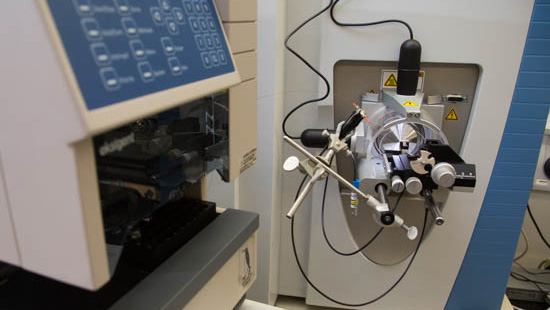Mass spectrometer will help identify diseases as companion to genomic medicine
 The University of Missouri-Kansas City and Children’s Mercy have teamed up to acquire a state-of-the-art device that will help identify diseases and accelerate research.
The University of Missouri-Kansas City and Children’s Mercy have teamed up to acquire a state-of-the-art device that will help identify diseases and accelerate research.
At first glance, the new mass spectrometer located in the UMKC School of Biological Sciences merely looks like a large computer. But the instrument analyzes and measures proteins with a speed and sensitivity many times above what was previously available to most researchers in the Kansas City area. Before, local scientists would have to collaborate with institutions outside the region to obtain this sophisticated level of analysis.
“We welcome opportunities to synergize with UMKC in support of Children’s Mercy’s mission,” said Tom Curran, chief scientific officer and executive director of the Children’s Mercy Children’s Research Institute. “This high-tech instrumentation installed at UMKC will be particularly useful to our outstanding Clinical Pharmacology and Genomic Medicine research programs. “
The Center for Pediatric Genomic Medicine at Children’s Mercy is the first genome center in the world inside a children’s hospital. It is also the first focused on genome sequencing and analysis for inherited children’s diseases. The new mass spectrometer, with its high level of protein analysis capabilities, will serve as a key companion.
“We are very pleased to partner with Children’s Mercy on the acquisition of the mass spectrometer,” said Lawrence Dreyfus, vice chancellor for research and economic development at UMKC. “This state-of-the-art equipment provides new avenues of molecular analysis, including biomarker discovery, proteome analysis and 3-D structural information, to name but a few. The potential for collaboration between our scientists and clinicians is exciting.”
Researchers from other universities and institutions, including MRI Global and the VA Medical Center, will also have access to the new instrument, a Thermo Fisher Scientific Q-Exactive Plus mass spectrometer. Acquisition of the $350,000 instrument was made possible by resources provided by Children’s Mercy, the UMKC Office of Research Services, the UMKC School of Biological Sciences and the UMKC Center of Excellence in the Study of Dental and Musculoskeletal Tissues.
According to Andrew Keightley, director of the UMKC proteomics core facility where the mass spectrometer is located, this new class of high-resolution instrument benefits from performance refinements since its introduction a few years ago: substantial improvements in control software capabilities and durability — and the cost has also come down significantly as well. On top of that, sample preparation methods and data analysis software have matured to accommodate “big data.”
“The result is excellent timing for us to enter into this initiative with our regional partners,” Keightley said.
“It has the ability to analyze down to 1/100th of a proton,” said Anthony Persechini, director of research for the School of Biological Sciences. He and Keightley initiated and led the effort to develop the partnership with Children’s Mercy and obtain the new instrument. “Amazing.”

